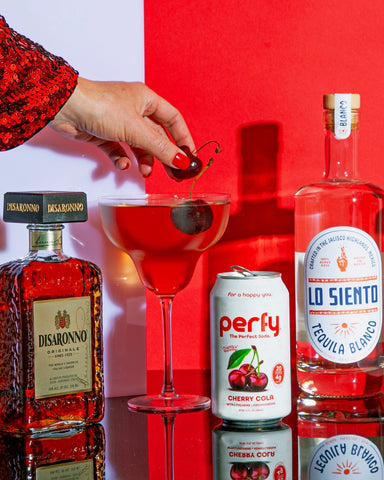In today's health-conscious world, many people are looking for refreshing yet healthier substitutes for traditional sodas. With various soda alternatives flooding the market, an important question arises: How do these beverages impact blood sugar levels? In this FAQ, we'll delve into the effects of soda alternatives, helping you make informed choices for your health and lifestyle.

What Are Soda Alternatives?
Soda alternatives are beverages that resemble traditional sodas in flavor and form but typically contain less sugar, fewer calories, or alternative sweeteners. They are designed to cater to those seeking healthier hydration options.
These alternatives come in various forms, such as flavored sparkling waters, diet sodas, and drinks sweetened with natural ingredients like stevia or monk fruit. The primary goal is to provide a satisfying beverage experience without the adverse health effects associated with excessive sugar intake. Many people turn to these options to enjoy their favorite fizzy drinks without the usual guilt.
The rise in popularity of these beverages can also be attributed to an increased awareness of the negative health impacts of added sugars. As more consumers become informed, the demand for no-sugar and low-calorie drinks continues to grow. Interestingly, replacing soda with drinks such as water, coffee, or tea has been shown to lower the risk of death from type 2 diabetes by over 20% Type 2 diabetes: Drinking water, coffee, or tea reduces risk of death.
Common Ingredients in Soda Alternatives
Soda alternatives often use ingredients like artificial sweeteners, natural sweeteners, and flavorings. Understanding these ingredients can help in assessing their effects on blood sugar levels.
Artificial sweeteners such as aspartame, sucralose, and stevia commonly find their way into these products. Each of these sweeteners interacts differently with the body, influencing blood sugar levels in various ways. While many artificial sweeteners are designed to mimic sugar's taste without its metabolic impact, not all are created equal.
Additionally, natural sweeteners such as honey, agave syrup, and maple syrup are sometimes used in these beverages. Although perceived as healthier options, it's important to note that these sweeteners can still influence blood glucose and should be consumed in moderation.
Lastly, soda alternatives like Perfy® were created for diabetics looking to enjoy soda again. Perfy® mimics nostalgic soda flavors while being sweetened with real fruit, stevia, and monk fruit.
How Do Alternative Sweeteners Affect Blood Sugar?
Artificial sweeteners such as aspartame, ace-k, and sucralose have varying impacts on blood sugar. While some may not raise blood glucose levels, others can have an effect depending on individual metabolism.
Studies have shown that some artificial sweeteners, despite being low-calorie, can still trigger an insulin response. This may result in increased hunger later, potentially leading to overeating. Hence, while sodas with these sweeteners may not spike blood sugar immediately, they might indirectly contribute to other metabolic issues over time.
Research has also hinted at possible digestive and metabolic consequences associated with frequent consumption of these artificially sweetened beverages. For instance, artificial sweeteners have been linked with changes in gut bacteria, which could affect insulin sensitivity and glucose tolerance. Given these considerations, individuals with diabetes or those monitoring their blood sugar levels may want to exercise caution with these alternatives.
Are There Healthier Options Among Soda Alternatives?
Exploring options like sparkling water, kombucha, and natural fruit-flavored drinks can provide healthier alternatives. These options can potentially mitigate the impact on blood sugar and offer additional health benefits.
Beverages such as kombucha not only satisfy the desire for a bubbly drink but also come packed with probiotics and other beneficial compounds. This naturally fermented drink is relatively low in sugar and can be an excellent choice for those wanting to support both gut health and low sugar intake. One downside can be the subtle (sometimes not so subtle) taste of vinegar, though, so drinkers beware.
Similarly, opting for unsweetened sparkling waters infused with natural fruit essences presents a refreshing beverage with practically no impact on blood sugar. These drinks offer the fun fizzy experience sans the calories and sugar, making them great go-to options for individuals seeking to satisfy soda cravings without the health drawbacks.
Tips for Choosing the Right Soda Alternatives
To make the best choice, always read the nutrition labels and ingredients list. Consider sugar content, types of sweeteners used, and any additional health claims before purchasing.
Keep an eye out for buzzwords like 'natural' or 'organic', which are often perceived as healthy but might still have hidden sugars. These claims often distract consumers from checking the actual nutritional content, leading to choices that might not align with their health goals.
Furthermore, understanding the various types of sweeteners can empower you to make educated decisions. Being attentive to how your body responds to different ingredients can also inform better choices. Every individual's metabolism is unique, and what works for one person may not work for another, so it's important to listen to your body.
Making Informed Choices with Soda Alternatives
In conclusion, while soda alternatives can offer a low-sugar or sugar-free refreshment option, it's important to understand their impact on blood sugar levels. Always check the labels for ingredients that can affect blood glucose, especially if you are managing diabetes or monitoring your carbohydrate intake. By choosing the right soda alternatives, like Perfy® (The Perfect Soda®) you can enjoy a satisfying drink without compromising your metabolic health goals.



